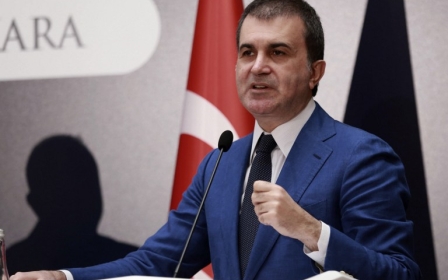Turkey says no difference between Dutch liberals and 'fascist' Wilders

Turkey said on Thursday there was "no difference" between the ruling Dutch liberals and the "fascist" anti-immigration politician Geert Wilders, after Dutch Prime Minister Mark Rutte defeated the far right in elections.
With Turkey locked in a diplomatic war of words with the European Union that erupted in the run-up to the polls, Turkish Foreign Minister Mevlut Cavusoglu predicted that "religious wars" will start in Europe.
"You look at the social democrats and the fascist Wilders, there is no difference, they have the same mentality," Cavusoglu said, quoted by state-run news agency Anadolu, referring to the ruling Liberal VVD party which won the most seats against Wilders and his Freedom Party (PVV).
Turkey and Europe have been locked in a diplomatic spat after the Netherlands and Germany blocked Turkish ministers from holding rallies to secure a "yes" vote in next month's referendum on expanding President Recep Tayyip Erdogan's powers.
While Erdogan has repeatedly accused the countries of acting like "Nazis", the European Union has warned Ankara to show moderation in its language.
"Where are you going, where are you taking Europe?" asked Cavusoglu, addressing Europe's leaders.
"You have begun to disintegrate Europe and take Europe to the cliff. Soon religious wars will begin in Europe," Cavusoglu warned.
"Because they were of different faiths, they killed each other 100 years ago," he said, without elaborating further on what he was referring to.
"But they learned a lesson from this and the European Union, the Council of Europe was set up," he said. "Europe is going back to those old days."
Cavusoglu questioned The Netherlands' understanding of "humanity, democracy and freedom", insisting Turkey would not remain passive against such actions.
"You will see in the coming period, we will take further steps," the minister added without giving further detail.
On 16 April, Turks will decide whether to approve constitutional changes to create an executive presidency, which the government insists will be like that of France or the United States but critics say it will lead to one-man rule.
Late Wednesday, Cavusoglu threatened to unilaterally scrap a March 2016 deal that has substantially reduced the flow of migrants and refugees to the EU.
In contrast to Turkey, European Commission President Jean-Claude Juncker congratulated Dutch Prime Minister Mark Rutte on his election victory, calling the result which disappointed anti-immigration eurosceptics "an inspiration for many".
"The people of the Netherlands voted overwhelmingly for the values Europe stands for: free and tolerant societies in a prosperous Europe," Juncker wrote in a letter posted online.
"Let us build a strong Europe together."
German Chancellor Angela Merkel also welcomed Rutte's victory but criticised the comments of Turkey's leaders.
"The Netherlands are our partners, friends, neighbours. Therefore I was very happy that a high turnout led to a very pro-European result, a clear signal," Merkel told a conference on demography on Thursday.
"And that after days in which the Netherlands had to tolerate accusations and reproaches from Turkey which are totally unacceptable... It was a good day for democracy."
Stay informed with MEE's newsletters
Sign up to get the latest alerts, insights and analysis, starting with Turkey Unpacked
Middle East Eye delivers independent and unrivalled coverage and analysis of the Middle East, North Africa and beyond. To learn more about republishing this content and the associated fees, please fill out this form. More about MEE can be found here.




